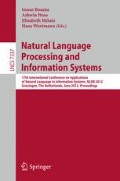Abstract
In this paper we present the initial results from our longitudinal study into the personal semantics of common meta-concepts used in conceptual modeling. People have an implicit understanding of many of the meta-concepts used for modeling purposes, although these are rarely ever made explicit. We argue that a proper understanding of how modelers personally interpret the meta-concepts they use in nearly all of their (domain) models can aid in several things, e.g. explicating a modeler’s (proto)typical concept usage, finding communities that share a conceptual understanding and matching individual modelers to each other. Our initial results include the analysis of data resulting from our study so far and a discussion what hypotheses they support.
Access this chapter
Tax calculation will be finalised at checkout
Purchases are for personal use only
Preview
Unable to display preview. Download preview PDF.
References
Aimé, X., Furst, F., Kuntz, P., Trichet, F.: Ontology Personalization: An Approach Based on Conceptual Prototypicality. In: Chen, L., Liu, C., Zhang, X., Wang, S., Strasunskas, D., Tomassen, S.L., Rao, J., Li, W.-S., Candan, K.S., Chiu, D.K.W., Zhuang, Y., Ellis, C.A., Kim, K.-H. (eds.) WCMT 2009. LNCS, vol. 5731, pp. 198–209. Springer, Heidelberg (2009)
Almeida, M.B.: A proposal to evaluate ontology content. Applied Ontology 4, 245–265 (2009)
Ayala, et al.: A comparative analysis of i*-based agent-oriented modeling languages. In: SEKE 2005, Taipei, Taiwan, pp. 43–50 (2005)
van Buuren, R., Gordijn, J., Janssen, W.: Business case modelling for e-services. In: 18 th Bled eConference eIntegration in Action (2005)
Dijkman, R.M., Quartel, D.A.C., van Sinderen, M.J.: Consistency in multi-viewpoint design of enterprise information systems. Inf. Softw. Technol. 50(7-8), 737–752 (2008)
Hoppenbrouwers, S.J.B.A.: Freezing language: conceptualisation processes across ICT-supported organisations. Ph.D. thesis, Radboud University Nijmegen (2003)
Katifori, V., Poggi, A., Scannapieco, M., Catarci, T., Ioannidis, Y.: Ontopim: how to rely on a personal ontology for personal information management. In: Proc. of the 1st Workshop on The Semantic Desktop. Citeseer (2005)
Lankhorst, M.M.: Enterprise architecture modelling–the issue of integration. Advanced Engineering Informatics 18(4), 205–216 (2004)
van der Linden, D.J.T., Hoppenbrouwers, S.J.B.A., Lartseva, A., Proper, H.A(E.): Towards an Investigation of the Conceptual Landscape of Enterprise Architecture. In: Halpin, T., Nurcan, S., Krogstie, J., Soffer, P., Proper, E., Schmidt, R., Bider, I. (eds.) BPMDS 2011 and EMMSAD 2011. LNBIP, vol. 81, pp. 526–535. Springer, Heidelberg (2011)
Van Nuffel, D., Mulder, H., Van Kervel, S.: Enhancing the Formal Foundations of BPMN by Enterprise Ontology. In: Albani, A., Barjis, J., Dietz, J.L.G. (eds.) CIAO!/EOMAS 2009. LNBIP, vol. 34, pp. 115–129. Springer, Heidelberg (2009)
Perelman, C., Olbrechts-Tyteca, L.: The New Rhetoric: A Treatise on Argumentation. University of Notre Dame Press (June 1969)
Sowa, J.: The role of logic and ontology in language and reasoning. In: Poli, R., Seibt, J. (eds.) Theory and Applications of Ontology: Philosophical Perspectives, pp. 231–263. Springer, Netherlands (2010)
Uschold, M.: Making the case for ontology. Applied Ontology (2011)
Verhagen, T., Meents, S.: A framework for developing semantic differentials in is research: Assessing the meaning of electronic marketplace quality (emq). Serie Research Memoranda 0016, VU University Amsterdam, Faculty of Economics, Business Administration and Econometrics (2007)
Wilke, C., Demuth, B.: Uml is still inconsistent! how to improve ocl constraints in the uml 2.3 superstructure. Electronic Communications of the EASST 44 (2011)
Author information
Authors and Affiliations
Editor information
Editors and Affiliations
Rights and permissions
Copyright information
© 2012 Springer-Verlag Berlin Heidelberg
About this paper
Cite this paper
van der Linden, D., Gaaloul, K., Molnar, W. (2012). Initial Results from a Study on Personal Semantics of Conceptual Modeling Languages. In: Bouma, G., Ittoo, A., Métais, E., Wortmann, H. (eds) Natural Language Processing and Information Systems. NLDB 2012. Lecture Notes in Computer Science, vol 7337. Springer, Berlin, Heidelberg. https://doi.org/10.1007/978-3-642-31178-9_48
Download citation
DOI: https://doi.org/10.1007/978-3-642-31178-9_48
Publisher Name: Springer, Berlin, Heidelberg
Print ISBN: 978-3-642-31177-2
Online ISBN: 978-3-642-31178-9
eBook Packages: Computer ScienceComputer Science (R0)

